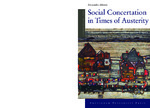Social Concertation in Times of Austerity
European Integration and the Politics of Labour Market Governance in Austria and Switzerland
| dc.contributor.author | Afonso, Alexandre | |
| dc.date.accessioned | 2013-12-31 23:55:55 | |
| dc.date.accessioned | 2019-12-10 14:46:32 | |
| dc.date.accessioned | 2020-04-01T15:00:19Z | |
| dc.date.available | 2020-04-01T15:00:19Z | |
| dc.date.issued | 2013 | |
| dc.identifier | 442727 | |
| dc.identifier | OCN: 1030815387 | en_US |
| dc.identifier.uri | http://library.oapen.org/handle/20.500.12657/33913 | |
| dc.description.abstract | Why do governments still negotiate with trade unions and employers in the design of labour market and welfare reforms despite the steady decline of trade union membership almost everywhere in Europe? Social Concertation in Times of Austerity investigates the political underpinnings of social concertation in this new context with a focus on the regulation of labour mobility and unemployment protection in Austria and Switzerland. It shows that the involvement of organised interests in policymaking is a strategy of compromise-building used by governments when they are faced with party-political divisions, or when unpopular reforms are likely to have risky electoral consequences. | |
| dc.language | English | |
| dc.relation.ispartofseries | Changing Welfare States | |
| dc.subject.classification | thema EDItEUR::J Society and Social Sciences::JB Society and culture: general::JBF Social and ethical issues | en_US |
| dc.subject.other | sociology | |
| dc.subject.other | sociologie | |
| dc.subject.other | Austria | |
| dc.subject.other | Corporatism | |
| dc.subject.other | European integration | |
| dc.subject.other | Labour economics | |
| dc.subject.other | Swiss People's Party | |
| dc.subject.other | Switzerland | |
| dc.subject.other | Trade union | |
| dc.subject.other | Unemployment | |
| dc.title | Social Concertation in Times of Austerity | |
| dc.title.alternative | European Integration and the Politics of Labour Market Governance in Austria and Switzerland | |
| dc.type | book | |
| oapen.abstract.otherlanguage | Waarom moeten overheden nog steeds onderhandelen met vakbonden en werkgevers, terwijl het ledenaantal van vakbonden bijna overal in Europa daalt? De auteur onderzoekt de politieke fundamenten van het sociaal overleg in deze nieuwe context. De focus ligt op de regulering van arbeidsmobiliteit en werkloosheidsuitkeringen in Oostenrijk en Zwitserland. Het werk laat zien dat overheden belangenorganisaties strategisch betrekken in de beleidsvorming, bijvoorbeeld wanneer een overheid geconfronteerd wordt met partijpolitieke verdeeldheid, of wan- neer impopulaire hervormingen negatieve electorale gevolgen kunnen hebben. | |
| oapen.identifier.doi | 10.26530/OAPEN_442727 | |
| oapen.relation.isPublishedBy | dd3d1a33-0ac2-4cfe-a101-355ae1bd857a | |
| oapen.pages | 260 | |
| oapen.remark.public | Relevant Wikipedia pages: Austria - https://en.wikipedia.org/wiki/Austria; Corporatism - https://en.wikipedia.org/wiki/Corporatism; European integration - https://en.wikipedia.org/wiki/European_integration; Labour economics - https://en.wikipedia.org/wiki/Labour_economics; Swiss People's Party - https://en.wikipedia.org/wiki/Swiss_People%27s_Party; Switzerland - https://en.wikipedia.org/wiki/Switzerland; Trade union - https://en.wikipedia.org/wiki/Trade_union; Unemployment - https://en.wikipedia.org/wiki/Unemployment | |
| oapen.identifier.ocn | 1030815387 |

